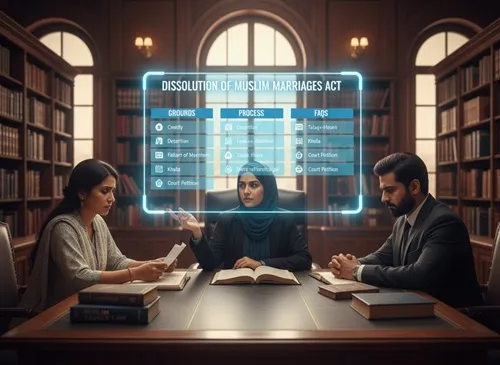
The Dissolution of Muslim Marriages Act, 1939 empowers Muslim women in India to seek a court divorce (judicial divorce) when their husbands fail in marital duties or commit misconduct. Before this Act, only men had a clear right to divorce (talaq). The Act balanced that by allowing women to seek divorce through court on defined grounds.
Grounds for Divorce Under the Act
A Muslim woman can file for divorce if her husband:
- Has been missing for 4 years.
- Neglects or fails to provide maintenance for 2 years.
- Is imprisoned for 7 years or more.
- Fails to perform marital obligations for 3 years.
- Was impotent at the time of marriage and remains so.
- Is insane or suffers from a serious disease.
- Treats her cruelly — physical abuse, moral pressure, or mental torture.
- Marries another woman without consent and causes harm.
- Was married off before age 15 and repudiates it before 18 (if not consummated).
How to File for Divorce Under This Act (Step-by-Step)
- Step 1: Approach the Family Court under your jurisdiction.
- Step 2: File a petition under the Dissolution of Muslim Marriages Act, 1939.
- Step 3: Attach supporting documents —
- Nikahnama (marriage certificate)
- Proof of residence
- Grounds of divorce (letters, medical proofs, witness statements)
- ID proof of the wife
- Step 4: Court issues a notice to the husband to appear and respond.
- Step 5: Hearing and Evidence — both parties are heard.
- Step 6: If grounds are valid, the court grants a decree of divorce.
- Step 7: Wife observes the iddat period before remarrying.
After Divorce – What Does the Wife Get?
The Act itself doesn't fix a pre-decided amount, but Muslim women are entitled to financial rights under Muslim personal law and other applicable laws.
| Type | Meaning | When Payable | Example |
|---|---|---|---|
| Mehr (Dower) | Money or property promised by the husband at marriage. | Must be paid in full at the time of divorce if not already given. | ₹25,000 mentioned in the Nikahnama – payable upon divorce. |
| Maintenance (Nafqah) | Living expenses for the wife during iddat and possibly beyond. | During iddat (about 3 months) or until remarriage. | Food, rent, and medical expenses. |
| Return of Stridhan | All gifts and belongings were given to the woman during marriage. | At the time of separation or divorce. | Jewellery, clothes, money, etc. |
| Mata / Fair Provision (as per Supreme Court rulings) | A reasonable settlement or provision for future livelihood. | One-time settlement was decided by the court. | Lump sum compensation based on the husband's means. |
Note:
- There is no pre-fixed amount like "₹X lakh per divorce".
- The Family Court or Magistrate decides the amount depending on the husband's income, the wife's needs, lifestyle, and marriage duration.
- The Supreme Court in Shah Bano (1985) and later cases ensured that a divorced Muslim woman can claim fair maintenance under Section 125 of CrPC (now Bharatiya Nagarik Suraksha Sanhita) if she is unable to maintain herself.
FAQs – Dissolution of Muslim Marriages Act, 1939
-
Can a Muslim woman file for divorce under this law?
-
Yes. She can file a court case under this Act on legal grounds.
-
What if the husband is missing?
-
If he's missing for 4 years, she can get a divorce decree.
-
Is non-maintenance a ground?
-
Yes, if the husband hasn't provided for her for 2 years.
-
Can cruelty include mental abuse?
-
Yes. Both physical and emotional cruelty are covered.
-
What if the husband is imprisoned?
-
A sentence of 7 years or more is a valid ground.
-
Can she divorce for the illness or insanity of her husband?
-
Yes, for serious physical or mental illness.
-
Is impotence valid ground?
-
Yes, if it existed at marriage and continues.
-
Can a woman reject a child marriage?
-
Yes, before turning 18, if it wasn't consummated.
-
Can she divorce if husband remarries?
-
Yes, if the second marriage causes her harm or injustice.
-
Does this apply to all sects?
-
Yes, both Sunni and Shia Muslims.
-
What about mehr and maintenance?
-
She is entitled to unpaid mehr, maintenance, and fair provision.
-
Is khula the same as this Act?
-
No, khula is mutual; this Act covers court divorce.
-
Can a woman remarry?
-
Yes, after completing the iddat period.
-
Who keeps the children?
-
Usually the mother for minors, unless the court decides otherwise.
-
Does she have to return mehr?
-
Only in khula, not in judicial divorce under this Act.
-
Can husband appeal?
-
Yes, under civil appeal provisions.
-
Does this Act protect against forced marriages?
-
Yes, indirectly by allowing later annulment.
-
Can she claim property rights?
-
She doesn't get her husband's property by divorce but gets her lawful dues (mehr, maintenance, Stridhan).
-
Can the wife live separately during the case?
-
Yes, and she can claim interim maintenance.
-
Is this law valid across India?
-
Yes, it's a central law applicable everywhere.
Add new comment